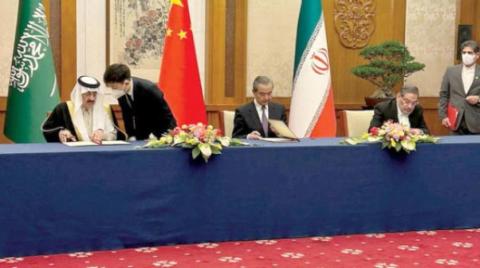
The countdown to COP28 is accelerating and all those associated with putting on such global events know how quickly time flies. But this timetable does not just affect the organizers. It is also a galvanizing call for those who want to use the world’s spotlight on the region to draw attention to issues beyond the obvious, but still intimately connected with the impact of climate change. More importantly, to remind the world of what can and is being done to combat issues already emerging, but which will get worse unless tackled with the determination that COP28 is sure to display in many fields.
The annual Dubai International Humanitarian Aid and Development conference, held earlier this month, struck a chord with its theme of “Energy and Aid: Capitalizing on Available Resources.” Climate change, not least in the Middle East and North Africa region, will be felt well beyond the price of oil or the need for diversification of supplies. Food, food security and especially nutrition, currently less well recognized than it must become, will be far more center stage than people currently realize.
As an adviser to The Power of Nutrition, a nongovernmental organization set up following the first Nutrition for Growth Summit held in the UK in 2013, I had the opportunity to address an excellent session at DIHAD on why it matters here particularly. The MENA region can feel the heat — literally. As it rises, and drought follows, the staples that communities rely upon become scarce. In the Arab region, some 51 million people suffer from hunger. In neighboring East Africa, malnutrition affects between 26 percent and 38 percent of children under five in individual states. Malnutrition is the cause of 45 percent of all child deaths globally.
It is not just the lack of food, it is its quality. The Power of Nutrition came into existence to draw attention to the tragedy of stunting and wasting, the impact on a human frame of the lack of key nutrients, especially in the first 1,000 days of life, which has a lifelong effect on health and development. Quite apart from the cost in human terms, there is also an economic cost. A study conducted by The Power of Nutrition and Modern Scientist Global, published in The Lancet in 2022, estimated that a quarter of a trillion dollars was lost by the private sector in low- and middle-income countries each year due to employees’ lack of nourishment as children.
It is not just humanity’s impact on the natural world that causes malnutrition, but our endless conflicts.
Alistair Burt
We are getting toward the end of the UN’s Decade of Action on Nutrition 2016-25, so it is a perfect time to join the dots of climate change and the damage done to the security of food supply and to tackle the chronic underfunding of nutrition on a global scale. As a development orphan sector, attracting only 1 percent of standard development funding, it is estimated there is an annual shortfall of $11 billion for nutrition-specific interventions. The Power of Nutrition, aided by a fantastic response and encouragement from a range of Gulf ambassadors to the UK, has been in the region to talk with governments and NGOs about the possibilities of using this year to do more.
We are engaged in some 19 countries, using our power of convening to bring together donors from all sectors to work with implementing partners on projects on the ground. Currently, in partnership with the Islamic Development Bank and the World Food Program, we are working to create and implement the “First Thousand Days Initiative,” mobilizing some $200 million of resources for the most vulnerable, specifically in Organization of Islamic Cooperation countries.
The focus of COP28 on the MENA region will allow for a demonstration of all that is being done here to combat the impact of climate change. It will highlight the growing risk to communities that cannot escape its effects at present and for which change may be coming too late. Attention paid to the challenge of combating malnutrition will be viewed as an important response from those with the power to do so.
There is still more that leaders here can do. It is not just humanity’s impact on the natural world that causes malnutrition, but our endless conflicts. We saw the impact of the loss of grain from Ukraine last year as it reached into areas far beyond where the war is being fought. But from Syria to Yemen, the MENA region bears witness to the pain caused to the innocent from those who wage war around them.
The Nobel Peace Prize-winning World Food Program, whose excellent head David Beasley retires soon, knows that two-thirds of its work is in conflict-affected areas. As the region becomes increasingly confident of pursuing foreign policy goals without external intervention, we should measure the impact of new deals between old adversaries and normalizations not in terms of photographs and red carpets, but on whether the conflicts in the region come to an end and the hungry get fed.
• Alistair Burt is a former UK Member of Parliament who has twice held ministerial positions in the Foreign and Commonwealth Office — as Parliamentary Under Secretary of State from 2010 to 2013 and as Minister of State for the Middle East from 2017 to 2019.
Twitter: @AlistairBurtUK












